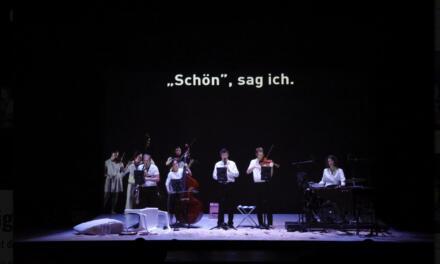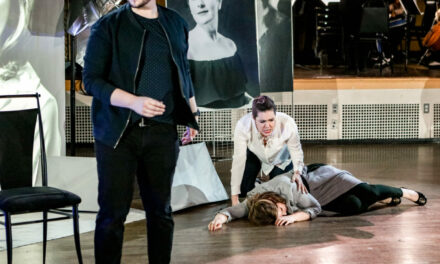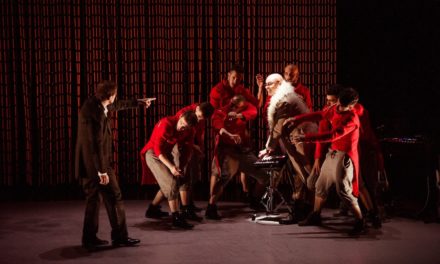Jumping from one story to another or from a specific timeline to an entirely different one seems, nowadays, to be specific to our phones’ world, rather than to theatre stages, but Dziewczyna, która podeptała chleb [EN: The Girl Who Trod on the Loaf] seems to be doing just that.
Skipping from “slice to slice”, Mariusz Grzegorzek brings us in a universe that pivots between a secular, money-oriented place where, according to the young model’s perspective, dreams go to die, and a liminal space, at the confluence of the real world and religious parabolas, marked by good defeating evil and ever-prevailing kindness. The girl’s journey is only one of many depicted on stage, and their rapid succession helps support the feeling of concomitance, of “all together”-ness.
Characters show little to no development, as if the slices of their lives were stills, rather than moving imagery, but the purpose of this production’s creators does not seem to be repentance, at least not for the people on stage. There is penitence, there is remorse, but no one can walk back on the same path they first came on, and the feeling of irrepeatability impounds the entire story.

Dziewczyna, która podeptała chleb [EN: The Girl Who Trod on the Loaf], directed by Mariusz Grzegorzek, at Teatr Wybrzeże, Gdańsk, Photo by Natalia Kabanow.

Dziewczyna, która podeptała chleb [EN: The Girl Who Trod on the Loaf], directed by Mariusz Grzegorzek, at Teatr Wybrzeże, Gdańsk, Photo by Natalia Kabanow.
Social media, the reels more specifically, appear to frame the entire storytelling – at first as a token of socio-economical emancipation (the girl posts and boasts about her life with the adoptive rich family), then as a record(ing) of failure, for both the model and the young actor. Somewhat more distanced, the filming team (and their “distant relative”, the model’s therapist) contributes to the field of information, of cinematographical art, rather than to the “mosh pit” of visuals that the world of video-based social media is. Characters, hence, seem to be spared of a tragic end according to their creative input, rather than to their moral basis, as the audience cannot form any actual opinion about the filming crew, given the very scarce information we have about them. It seems that not needing to repent in the first place is more important than penitence and returning to righteous morality, which, given the fact that humans are inherently subjected to Sin, is factually impossible and unrealistic.

Dziewczyna, która podeptała chleb [EN: The Girl Who Trod on the Loaf], directed by Mariusz Grzegorzek, at Teatr Wybrzeże, Gdańsk, Photo by Natalia Kabanow.
The rapid succession of scenes and visuals, and the alternance of the (constantly) present moment, with its contemporary issues and idiosyncrasies, and the Biblical illo tempore, with traditional Polish religious chants, however, does not follow a cinematographical approach. It builds itself around the fast pace typical to social media apps, as if the audience would indulge in the so-called doom scrolling, symbolical name in the case of this performance. If the damnation portrayed on stage reaches unfathomable levels, the spectators are not spared of their own tribulations, their own “doom”, either.
Mariusz Grzegorzek plays not only with historiography (in the shapes of ethno- and monography), but also with the minds of those present in the auditorium. He leads us towards a deeper understanding of our personal “today” in the context of having already left the past’s knowledge far behind, and also… leads us on, giving us the key to understanding the characters’ worlds only after the show, when, consciously or not, we all return to the virtual worlds of social media.
This post was written by the author in their personal capacity.The opinions expressed in this article are the author’s own and do not reflect the view of The Theatre Times, their staff or collaborators.
This post was written by Teodora Medeleanu.
The views expressed here belong to the author and do not necessarily reflect our views and opinions.


















